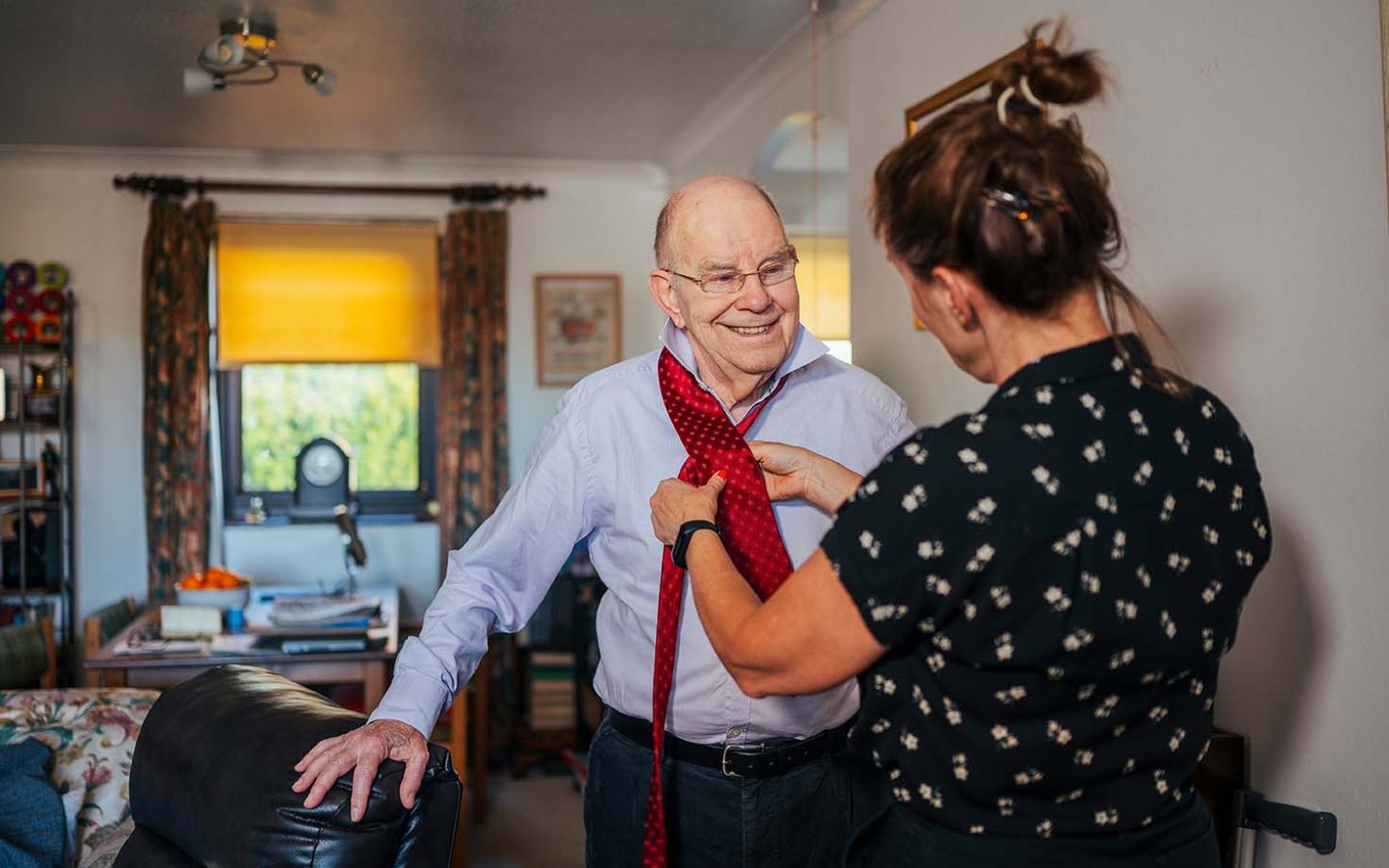Work, life care? Supporting carers to find the right balance for them
Carers are people who provide unpaid care by looking after someone who is older, disabled or seriously ill.
European Carers Day aims to coordinate and foster national efforts to raise awareness of carers’ experiences across Europe. This year’s theme highlights the fact that carers often have to make decisions that impact on their own wellbeing, health and financial security. In this commentary we explore policies that can support carers’ wellbeing – including a new initiative here at the University of Sheffield, as well as looking at some international examples to see how the UK compares, and considering how we could go further.
Why a work-life-care balance matters
The Centre for Care is a member of Eurocarers, an organisation bringing together carers’ groups, universities and research institutes across Europe to campaign for carers’ rights. This European Carers Day they are calling for changes to support work-life-care balance including:
- Supportive workplaces that understand and accommodate the challenges faced by carers, enabling them to stay in paid work.
- Accessible policies that provide information about resource and services to support carers
- Public awareness and recognition of the vital role carers play in our society. Striving to eliminate stigma and promote appreciation for carers’ dedication.
- Support mechanisms that reduce the financial burden on carers. This includes financial assistance, carer tax credits, and resources that ensure their economic stability.
- Balanced lives; a world where carers can pursue their aspirations, maintain their own wellbeing, and provide quality care to their loved ones while maintaining other aspects of their lives
Carers are the backbone of European care systems, but the toll on their health, social life and careers is a stark reminder that solidarity should never come at the cost of personal hardship. This must change – their support should be our priority.
Stecy Yghemonos
Our research in the Centre for Care, with Carers UK, shows that more women than men are carers and the largest group who become carers are people aged 46-65 (41%). This can impact their ability to work. Across the UK more than 1.9 million people in paid employment become carers every year.
What are carers legally entitled to?
In the UK, 2023 saw the introduction of the Carer’s Leave Act giving carers a statutory entitlement to at least one week of unpaid carer’s leave each year to provide care for a dependent with a long-term care need. The Act is a welcome step that has the potential to enable carers to better balance their job and their caring responsibilities however, there is more than must be done.
Centre for Care PhD student Christie Butcher highlights that:
It does not offer any financial aid to carers if they take any Carer’s Leave, meaning it will not be accessible to all. Some carers may not be able to afford to take time off work unpaid, especially those who are in challenging financial circumstances.
This suggests that it may disproportionately benefit those who are more well-off in society, potentially having the unintended consequence of increasing inequalities between carers. We may start to see these effects across space, for example, Local Authorities with higher levels of deprivation may not see the same benefits as the less deprived Local Authorities.
If this is the case, further effort needs to be made to support the needs of all carers, and policy needs to be implemented that ensures inequalities are reduced, rather than widened.
Christie Butcher, University of Sheffield
How can employers in the UK support a work-life-care balance?
The University of Sheffield (TUoS) is a member of Employers for Carers and has already implemented a range of measures to support carers at work including paid emergency leave and flexible working policies. Recently a new staff network was set up to support carers working at TUoS. Cliona Boyle, a carer for her 5 year old daughter who has Angelman syndrome, is the co-chair of the network. She describes how employers can support their staff:
Although there are a range of policies aimed at carers it can be hard for carers in crisis to know where to get help. The staff network aims to provide peer learning so that carers know where and how to get support. It is also a place for line managers to come to get advice and gain the knowledge they need to best help the people they manage. By raising the visibility of caring, line managers can be better placed to support carers and recognise when they might need help. The first conversation a carer has with their manager shouldn’t be when we are in crisis and the plates we are spinning have come crashing down, the discussions need to happen before that time.
Although carers need to be part of the conversation about what support they need, we can not be the only ones driving change. Carers are already working at capacity with the work and carer part of the equation, let alone the having a life part! Anyone can be a carer. So it is in all our interests to make the workplace as accessible as possible. If the workplace feels supportive and proactive it can make that part of the work-life-care balance that little bit easier. Carers often feel they need to fight numerous systems to get the care their loved ones need, we shouldn’t have to fight for recognition at work as well.
Good quality support and understanding combined with robust policies can enable carers to stay in the workplace but it has to be for everyone. Carers should not have to choose between the work we love and the people we love. We also need to recognise that not all policies work for all staff. For example flexible working and working from home may be an option for some staff here, but not those in estates or customer facing roles. Our policies need to recognise the range of roles in the University and the range of caring responsibilities employees have.
We need to do more to help line managers and employers to recognise their staff may be caring so they have early meaningful conversations about the support available. This way carers can stay in work and feel supported to do so.
Cliona Boyle, University of Sheffield
If you would like to know about the University of Sheffield Carers Staff network please email: carersnetwork@sheffield.ac.uk
How does the UK compare internationally?
The UK was the first adopter of many policies to support carers, and was emulated by other countries and carers’ organisations around the world. However, it is hard not to conclude that we have now fallen behind other nations in terms of the support that carers receive. A growing number of countries now offer statutory paid carers leave for example – in contrast to the unpaid leave introduced via the Carers Leave Act in the UK.
The table below summarises carers’ entitlements in 7 countries that have statutory paid leave. This is taken from a forthcoming book ‘Combining Work and Care: Carer Leave and Related Employment Policies in International Context’, edited by Kate Hamblin, Janet Fast and Jason Heyes.
| Australia | Canada | Finland | Germany | Italy | Japan | Sweden | |
|---|---|---|---|---|---|---|---|
Terminology | Personal / carers’ leave | Compassionate care leave (CCL) | Job alternation leave (JAL) | Family Care Leave | Carers leave | Family Care Leave | Compassionate Care Leave |
Legislation | Fair Work Act 2009 | Amendment to Canada Labour Code | Act on Job Alternation Leave | Act to Improve Compatibility between Family, Care and Work | Law No. 183/2010 | Child and Family Care Leave Act | National Social Insurance Act |
When was it first introduced? | 2005 | 2004 | 2003 | 2015 | 2000 | 1999 | 1989 |
Eligibility criteria – working situation | All full- and part-time employees (excluding casual employees). Accrues from first day of work. | Workers must have 600 insured hours of work. Self-employed workers are eligible if registered for Employment Insurance. | Employees must: have been with the same employer for at least 13 months; have been in employment for at least 20 years; be working at least 75% of full time hours | Short term leave is universal. Long term leave is not statutory for small and medium sized companies. | All employees. | All employees. Workers on fixed term contracts must: have been with their employer for at least 1 year; and have at least 93 days and 6 months left on their contract from the start date of the care leave. | All employees. |
Eligibility criteria – person needing care | To care for or support a member of their immediate family or household (i.e. co-resident non-family) who is: sick injured, or has an unexpected emergency. Includes care for family living overseas. | To care for a family member with a serious medical condition with a significant risk of death within 26 weeks. Certification by a medical practitioner is required. | Allows employees to take an extended period of time off work for no specific reason. | To organise or provide care for a close relative. | Short term leave is available to parents and close relatives, even when not living together. Long term leave is restricted to those living with a ‘severely disabled’ relative. | To care for a family member needing care due to injury, illness or physical or mental disability that requires more than two weeks of constant care. | To care for a person with a serious or life threatening illness. Both the carer and person cared for must be insured in Sweden. Medical certificate required. |
Details of the leave policy | Paid carers leave for 10 days per year. It carries over to the next year. Unpaid carers leave is available once this has been exhausted. | Maximum length varies but most jurisdictions provide 27 or 28 weeks leave. Leave can be shared with a family member. | Between 100 – 180 days, can be extended if employer agrees. Employer must hire an unemployed job-seeker. | Short term – max 10 working days. There are 2 long term options. Care Leave – full or partial release from work for up to 6 months. Family Care Leave – temporary reduction in working hours for up to 24 months. | Short term leave – 3 working days per month. Can be taken in half days or on an hourly basis. Long term leave – up to 2 years of paid leave. Principle of ‘sole carer’ – only one worker in a household can care for a person. | Up to 93 days of leave, can be taken flexibly in up to 3 instalments. | Max 100 days (240 days for person with HIV). Can be shared between family members or others. |
Pay / compensation | Normal wages paid. | Can claim up to 55% of salary, up to a maximum of $650 per week (funded through employment insurance). | Entitled to job alternation allowance – 70% of the unemployment allowance. | Care Support Allowance – usually 90% of lost net pay. This is paid by the long term care fund with whom the person in need of care is insured. | Normal wages paid, up to an earnings ceiling (adjusted over time according to inflation). | Compensation of up to 67% of salary through employment insurance system. | Compensation up to 80% of salary. |
Other | Paid sick and carer’s leave comes under the same leave entitlement. | Also offers Family Responsibility Leave of 3-12 days depending on jurisdiction. | Also offers Family Leave for ‘compelling family reasons’. This is unpaid and the employer can refuse requests. | An interest-free loan from the German government is available for those taking long term leave. | Unpaid short term carers leave is also available. |
About the authors
Becky joined the Centre for Care in June 2022 as a Research Associate, working closely with Professor Sue Yeandle. Her role is to ensure that our research makes a difference to care policy, using our evidence to respond to parliamentary inquiries and government consultations across the four nations of the UK. This will include working closely with the team to gather evidence on critical and emerging issues in care, as well as synthesising the grey and academic literature and engaging with our partners in the care sector.
Rachael is the Impact Specialist in the Centre for Care, working with academics and external partners including charities and policy makers to mobilise research findings to have the greatest impact beyond academia. Her role is to work with our researchers to plan for impact, explore the ways research findings can be widely shared and identify partnerships and possible collaborations.
More commentaries

Professor Nathan Hughes responds to the UK Government’s 2025 Spending Review in relation to children’s social care.
Read More about Can New Money Shift Old Systems? What the 2025 Spending Review Might Mean for System Change in Children’s Social Care
The Centre for Care team respond to last week’s 2025 UK government Spending Review.
Read More about Left on the Back-Burner: Adult Social Care and the 2025 Spending Review
In recent research carried out at the University of Sheffield, we explored whether children who had a social worker or were in care experienced worse outcomes in the criminal justice system than other children.
Read More about Supporting Vulnerable Children in the UK Care System
For National Children’s Day (UK), Becky Driscoll discusses our research in collaboration with Kinship, highlighting the need to provide further support to kinship carers.
Read More about Time to value kinship carers



